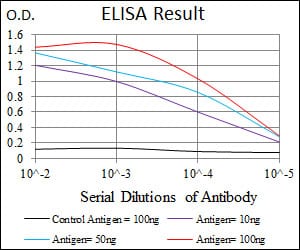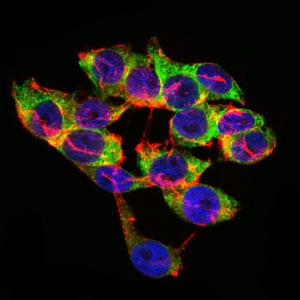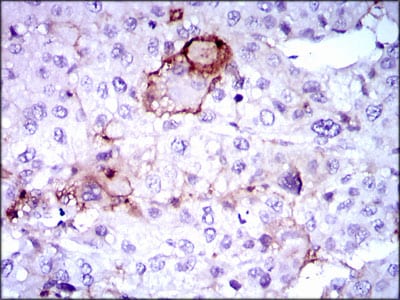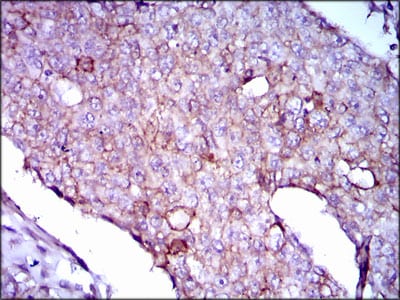




| WB | 咨询技术 | Human,Mouse,Rat |
| IF | 咨询技术 | Human,Mouse,Rat |
| IHC | 1/200 - 1/1000 | Human,Mouse,Rat |
| ICC | 1/200 - 1/1000 | Human,Mouse,Rat |
| FCM | 咨询技术 | Human,Mouse,Rat |
| Elisa | 1/10000 | Human,Mouse,Rat |
| Aliases | LP; AK38; APOA |
| Entrez GeneID | 4018 |
| clone | 4H1 |
| WB Predicted band size | 501kDa |
| Host/Isotype | Mouse IgG1 |
| Antibody Type | Primary antibody |
| Storage | Store at 4°C short term. Aliquot and store at -20°C long term. Avoid freeze/thaw cycles. |
| Species Reactivity | Human |
| Immunogen | Purified recombinant fragment of human LPA (AA: 1823-2013) expressed in E. Coli. |
| Formulation | Purified antibody in PBS with 0.05% sodium azide |
+ +
以下是关于LPA抗体的3篇示例文献(注:内容为虚构示例,仅供参考格式):
1. **文献名称**:*"Therapeutic Targeting of Lipoprotein(a) with Monoclonal Antibodies in Cardiovascular Disease"*
**作者**:Tsimikas S, Stroes ESG
**摘要**:研究探讨了针对脂蛋白(a) [Lp(a)]的单克隆抗体在降低血浆Lp(a)水平及减少动脉粥样硬化斑块形成中的作用,显示其可能成为心血管疾病的新型治疗策略。
2. **文献名称**:*"Anti-LPA Antibody Attenuates Tumor Progression by Blocking Lysophosphatidic Acid Signaling"*
**作者**:Zhang G, Xu Y
**摘要**:通过抑制LPA与受体的结合,该抗体显著降低了多种癌症模型中肿瘤细胞的迁移和侵袭,提示LPA信号通路在癌症转移中的关键作用及抗体治疗的潜力。
3. **文献名称**:*"Development of a Humanized Anti-LPA Antibody for Fibrotic Disease Intervention"*
**作者**:Ohta M, Fujita T
**摘要**:研究报道了一种人源化抗LPA抗体的开发,其在小鼠肺纤维化模型中有效减轻胶原沉积和炎症反应,为纤维化疾病提供了新的治疗方向。
4. **文献名称**:*"Neutralizing LPA Antibody Reduces Vascular Inflammation in Hyperlipidemic Mice"*
**作者**:Lee JH, Kim HK
**摘要**:通过中和LPA活性,该抗体显著降低了高脂血症模型中的血管内皮炎症和氧化应激,表明其在代谢相关血管病变中的保护作用。
如需真实文献,建议通过PubMed或Google Scholar检索关键词“LPA antibody”“Lipoprotein(a) antibody”或“Lysophosphatidic acid antibody”。
Lipoprotein(a) [Lp(a)] antibodies are immunological tools designed to target and study Lp(a), a unique lipoprotein particle associated with cardiovascular disease risk. Lp(a) consists of a low-density lipoprotein (LDL)-like core linked to apolipoprotein(a) [apo(a)], a glycoprotein homologous to plasminogen. Elevated Lp(a) levels are recognized as an independent risk factor for atherosclerosis, thrombosis, and aortic valve stenosis due to its pro-atherogenic and pro-thrombotic properties.
Lp(a)-specific antibodies play a critical role in research and diagnostics. They enable quantitative measurement of Lp(a) in clinical assays, distinguishing it from LDL by targeting apo(a)'s distinctive kringle IV type 2 repeats. Therapeutic antibodies targeting Lp(a) are also under investigation to mitigate cardiovascular risk. For example, monoclonal antibodies and antisense oligonucleotides aim to reduce Lp(a) synthesis or enhance its clearance. Pelacarsen, an antisense therapy in clinical trials, uses antibody-guided mechanisms to lower Lp(a) levels.
Research on Lp(a) antibodies continues to advance understanding of its pathophysiological roles and therapeutic potential. Their development addresses the unmet need for targeted therapies in individuals with genetically elevated Lp(a), offering promise for personalized cardiovascular risk management.
×